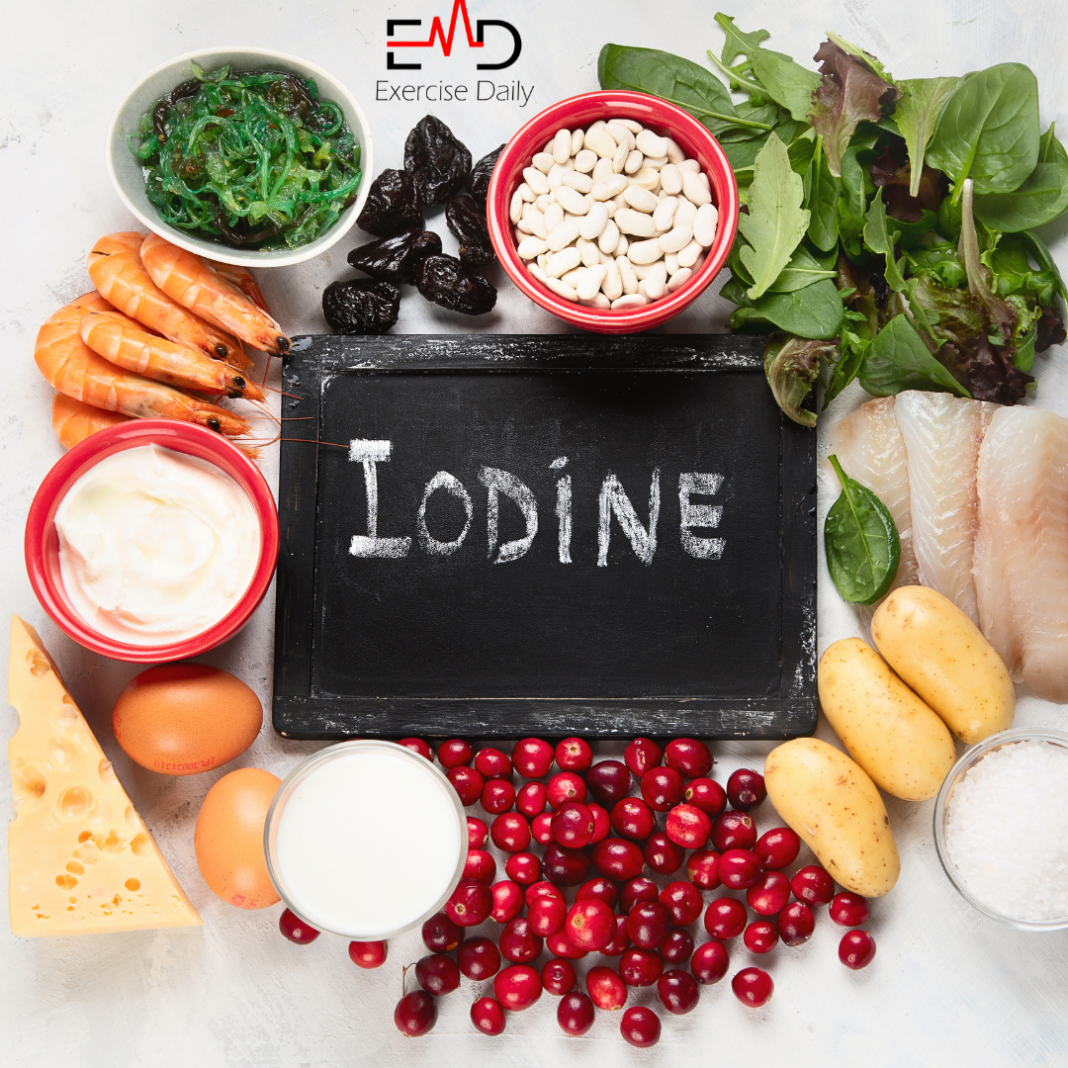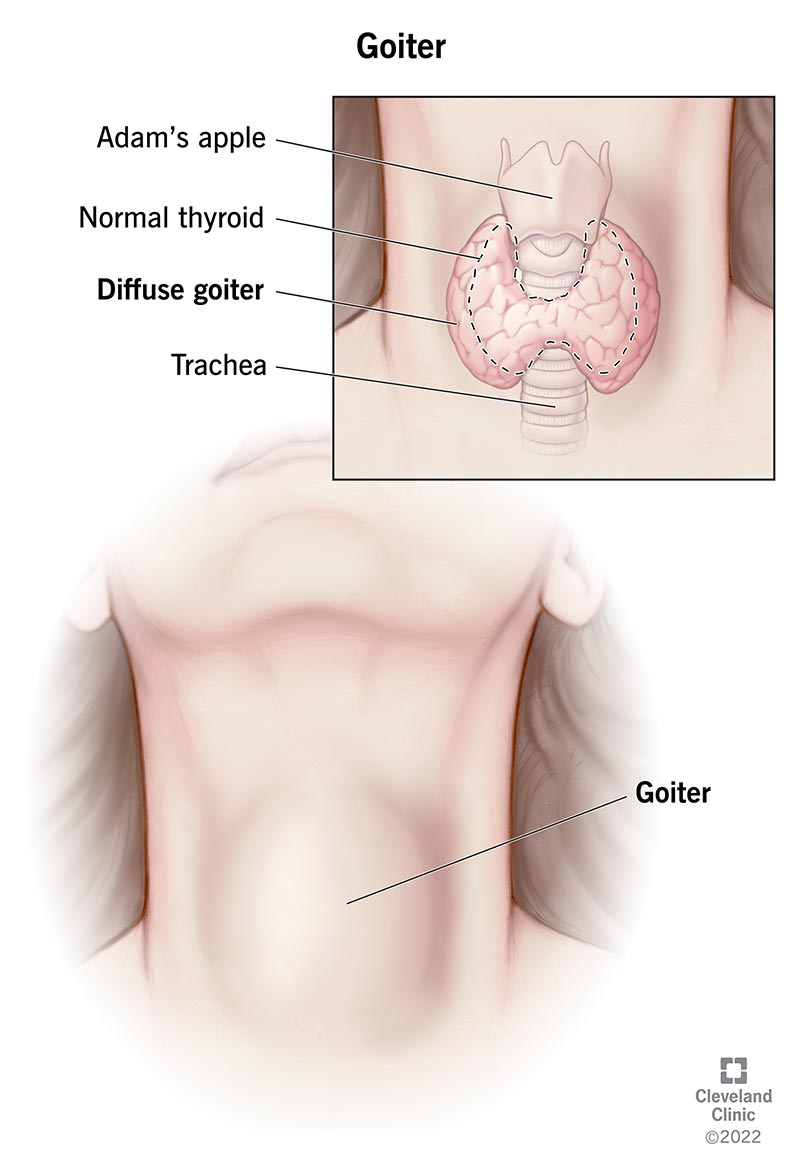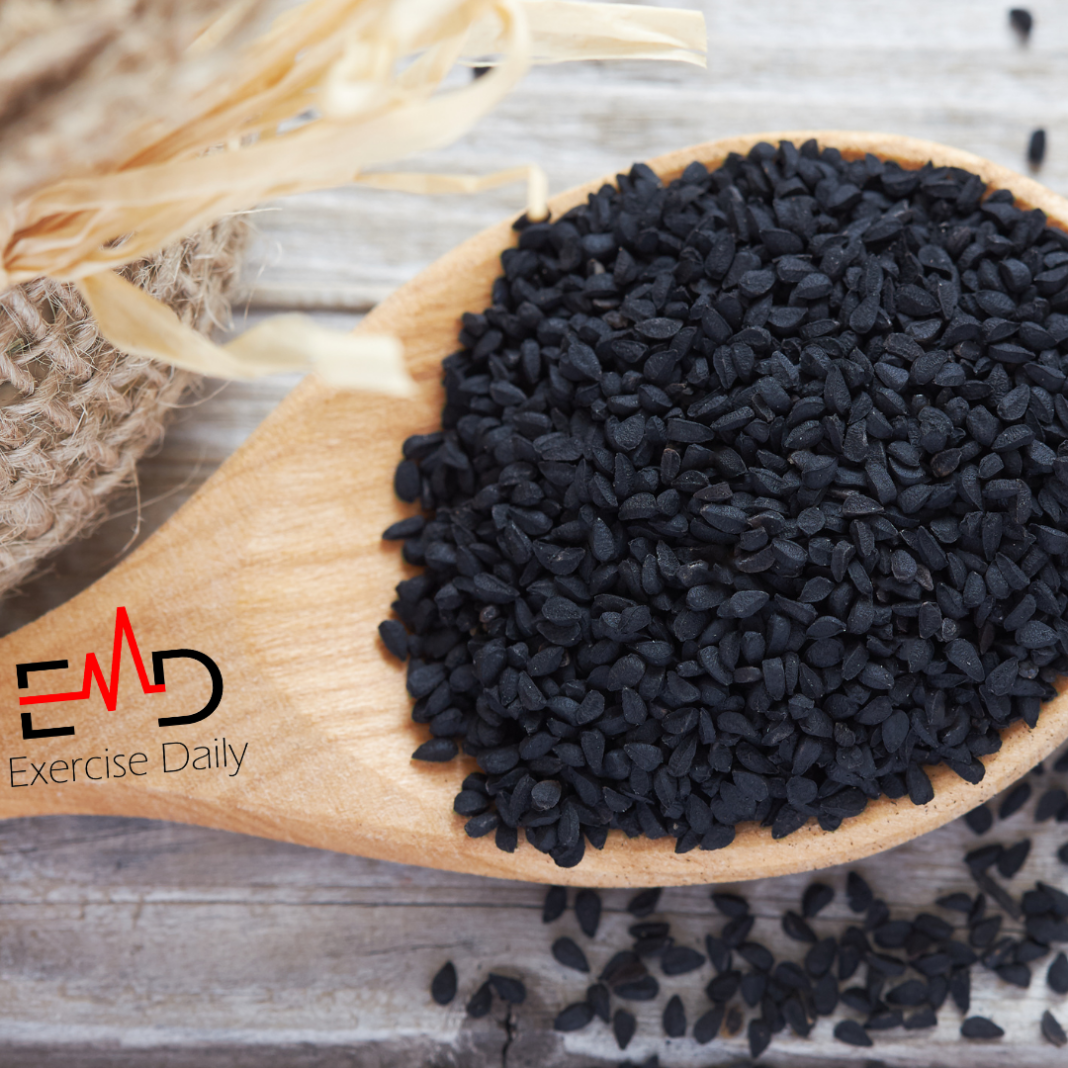Exercise daily – Iodine is essential for human health, and it is needed to manufacture thyroid hormones that regulate growth and development, brain function, metabolism, body temperature, and energy levels.
The human body needs only a tiny amount of iodine to produce thyroid hormones; therefore, it can be toxic when consumed in excess amounts. We will talk about iodine and how it benefits people’s health.
This article will tell you about the signs, symptoms, and complications of iodine deficiency and should I should take iodine at night or morning. So let’s dive in.
Iodine:
Iodine is an important mineral that is essential to make thyroid hormones. These hormones are necessary for the function of the brain and the maintenance of body energy and heat.

Food Rich In Iodine:
Following are the foods rich in iodine:
- Dried seaweed
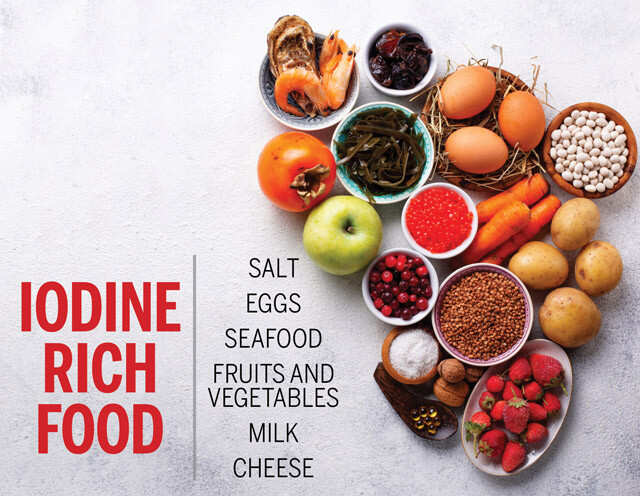
- Codfish
- Yoghurt
- Baked potato
- Eggs
- Tuna
- Turkey
- Cranberries
- Strawberries
Health Consequences Of Iodine Deficiency:
Iodine deficiency can lead to hypothyroidism when the thyroid gland doesn’t produce enough hormones. This can lead to weight gain and slowed mental functioning. Following are the health consequences that are common due to Iodine deficiency:
- Goiter is common in all ages.
- Increased susceptibility of the thyroid gland to nuclear radiations.
- Abortion, stillbirth, and congenital anomalies can happen in fetuses.
- Impaired mental function and delayed physical development are common in children and adolescents.
- Toxic nodular goiter and iodine-induced hyperthyroidism can occur in adults.
- Increased occurrence of hypothyroidism in moderate-to-severe iodine deficiency.
Hypothyroidism:
When thyroid hormone level becomes low in the bloodstream, hypothyroidism occurs, and metabolism slows down. It is also known as underactive thyroid disease. Myxedema, in which thyroid levels are deficient.
Causes:
- Autoimmune disease
- Over-response to hyperthyroidism treatment.
- Thyroid surgery
- Iodine deficiency
Symptoms:
- Fatigue
- Numbness and tingling in your hands
- Having constipation
- Gaining weight
- Being unable to tolerate the cold temperature.
Does hypothyroidism cause salt cravings?
Salt craving is the leading cause of salt craving because your body is not producing enough thyroid hormone, whose activity depends on iodine. Thus the body craves salt.
Goiter:
In the goiter, a thyroid gland becomes more prominent than usual. The thyroid gland is present in the lower area of the neck. It is just like the shape of a butterfly. People with iodine deficiency have goiter because they don’t make enough thyroid hormone.
Types:
There are two types of goiter:
Diffuse goiter:
Where the thyroid gland swells and feels smooth in touch.
Nodular goiter:
Where solid-filled lumps develop within the thyroid, making the thyroid gland feel lumpy.
Symptoms:
- Swelling in the front of the neck
- Feeling of tightness in the throat area.
- Dizziness occurs when someone raises their arms above their head.
Complications:
- Goiter compresses the windpipe.
- Produce chocking
- Hemorrhage in nodules.
Prevention and treatment of Iodine deficiency:
Following are the steps that we can take to prevent or control iodine deficiency:
- Food fortification
- Universal salt iodization
- Supplementation
- Health Education
- SET surveillance techniques
Should I Take Iodine At Night Or Morning?
Iodine is stored in your thyroid gland and is usually released throughout the day. Iodine can sometimes be removed at night, accumulating in the thyroid gland. Individuals with a history of urinary iodine loss should take it during the morning after an overnight fast to avoid overloading their thyroid glands.
To maintain healthy levels of iodine, it is recommended that you take iodine supplements at night because your body will have time to absorb it into your system before you go to bed. Many recommend taking half a teaspoon of iodine daily, split into two doses. You can take one dose in the morning and one dose at night.
If you have thyroid problems, you can take iodine supplements. Some people feel nausea or vomiting after eating iodine supplements so they can take the iodine during a meal.
An adult’s recommended amount of iodine is 140 micrograms (μg) a day. They can take this amount through a healthy and iodine-rich diet.
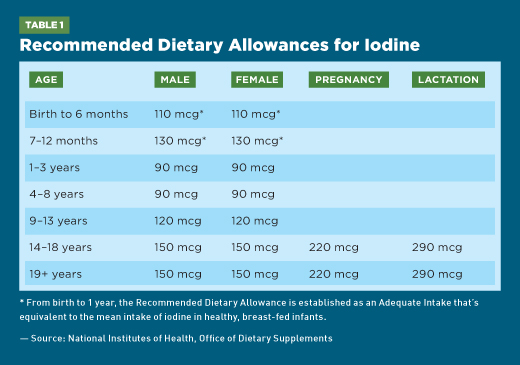
Best supplements of Iodine:
Now I will tell you some best iodine supplements that you can try if you have iodine deficiency:
NOW Supplements, Thyroid Energy™, Iodine, and Tyrosine plus Selenium, Zinc, and Copper, 90 Veg Capsules:
$12.84
Description:
NOW Thyroid Energy is the best nutritional supplement for the support of a healthy thyroid gland. They added tyrosine and iodine that is also necessary for thyroid function.
Pros:
- It is Non-GMO, Kosher, Dairy Free, and Egg Free.
- It is made without gluten and soy.
- It is unflavored.
Cons:
Exposure to sunlight can damage the product.
Life Extension Sea-Iodine 1000 mcg:
$6.60
Description:
These are iodine supplements that are free from salt. Iodine is a trace element that is important for good health.
Pros:
- It is unflavored.
- There are many reviews that people feel very energetic after eating these capsules.
- It is gluten-free.
Cons:
It is not affordable.
Potassium Iodide | Iodine Supplement:
$19.95
Description:
Iodine is very beneficial for our body because our body cannot produce this element. If you are pregnant you should add iodine supplements to your diet.
Pros:
- It is in liquid form so it is very to consume.
- It is best for vegan people.
- It is NON-GMO.
Cons:
It is a little bit expensive.
5 Uses of Iodine:
The following are the uses of iodine in the body:
-
Iodine for thyroid health:
Iodine is a thyroid element that is important for the production of thyroid hormones. It is also a component of T3 and T4, which help regulate metabolism and many other bodily functions.
The thyroid gland uses iodine to make two hormones, thyroxine (T4) and triiodothyronine (T3). These hormones control how fast the body uses energy. They also affect growth and development in children.
If you have a low level of iodine in the thyroid gland, it can lead to the condition of hypothyroidism. So it would help if you took care of the amount of iodine in your diet. If you are deficient in it, you can eat dairy food with a high quantity of iodine.
2. Controlling overactive thyroid gland:
In an overactive thyroid gland, the thyroid gland produces a high quantity of thyroid hormone. The symptoms of this condition are usually weight loss, rapid heart rate, and tremors.
A person with an overactive thyroid gland will need to take medication that slows down hormone production or have their thyroid removed.
There are two main options when it comes to treatment:
Pills – These are usually taken daily to replace or supplement the missing hormone.
Injections – These come in many forms and are generally given as a single dose once every few weeks.
The dosages vary depending on your needs and medical condition.
3. Preventing congenital iodine deficiency syndrome (Cretinism):
It is a congenital disorder. It occurs due to an insufficient amount of thyroid hormone. In this condition, a person becomes physically and mentally disabled due to iodine deficiency during early pregnancy.
Children with hypothyroidism from birth are known as cretins. It is due to an insufficient amount of iodine. So, to prevent this condition, you should take care of your iodine level during pregnancy. And also avoid the use of anti-thyroid drugs or sulfonamides during pregnancy.
4. Role of Iodine in reproductive failure:
Iodine is an essential nutrient that is essential for normal reproductive functions. Iodine requirements increase in women during pregnancy and breastfeeding (200-250 micrograms and 200- 290 micrograms).
The risk of miscarriage increased with increasing TSH. Women with a TSH between 4.5-10m U/L or greater than 10mU/L had an increased risk of miscarriage.
5. Iodine for treating infections:
Iodine has many uses in a home medicine cabinet. We can use iodine to disinfect wounds, kill bacteria, and sterilize surfaces. In some cases, iodine can be used as an antiseptic treatment for minor injuries or burns.
Iodine is best to treat certain thyroid disorders like goiter, hyperthyroidism, and hypothyroidism. We can also use iodine to test for urine or stool samples allergens.
Iodine is typically used to treat goiter and cretinism. Iodine can also be used to treat a skin condition called iododerma. In the United States, iodine is available as a dietary supplement over the counter in most countries in the world, including Canada and Australia.
Should I Take Iodine At Night Or in the Morning? FAQs:
The following are the commonly asked questions about iodine:
1. Why do we need Iodine?
Iodine is an important mineral for the thyroid to function correctly. In iodine deficiency the thyroid gland does not have enough iodine, causing hypothyroidism. It can lead to goiter and stunted growth in children and cause mental retardation, deafness, and blindness.
2. What is the recommendation for iodine?
The World Health Organization (WHO) recommends an intake of 150 µg/day for adults and 100 µg/day for children aged 7-10 years old or older.
3. How can I increase the iodine element in my diet?
Iodine is an element that is needed in a very small amount for the human body to function correctly. It is essential to produce thyroid hormones responsible for regulating metabolism. Iodine also plays a role in normal brain development and function.
The best way to get iodine into your diet is by eating foods that contain it naturally or by taking a supplement. Some foods rich in iodine include seafood, seaweed, milk and yogurt, eggs, potatoes, soybeans, and cabbage.
4. Can I use a supplement to get the required levels, or do I have to eat certain foods?
If you have a deficiency of a particular vitamin, you may need to eat more food that is rich in that vitamin. But if you are having trouble getting the required levels of a particular vitamin from your diet, then supplements may be an option for you.
Supplements are not as good as eating whole foods because they don’t contain all the essential nutrients found in whole foods.
5. How to test for iodine deficiency?
Some people may not get enough iodine from their diet or have any medical condition that prevents them from adequately absorbing iodine or converting it to thyroid hormones.
The WHO has identified iodine deficiency as one of the most common causes of mental problems worldwide.
Take away:
Iodine is also essential for the accurate function of the thyroid gland. The recommended dietary intake of iodine is 150 micrograms per day in adults and 220 micrograms in pregnant women. The body’s daily requirement can be obtained from food alone, but it can also be supplemented through a multivitamin.
Iodine deficiency causes hypothyroidism, which leads to goiter and cretinism in children and myxedema in adults. It can also lead to low intelligence quotient (IQ) and poor school performance. Should I Take Iodine At Night Or the Morning? We also answered this question.
In conclusion, taking iodine is necessary for metabolism as well as for the normal functioning of the thyroid gland. So start taking care of the iodine level in your body because its deficiency can cause serious consequences.
You can ask us in the comment section if you have any questions regarding this topic.

